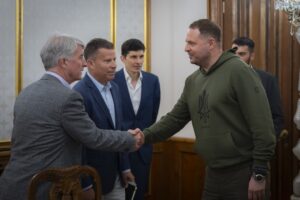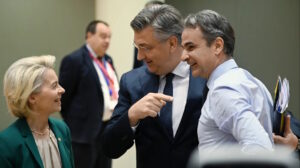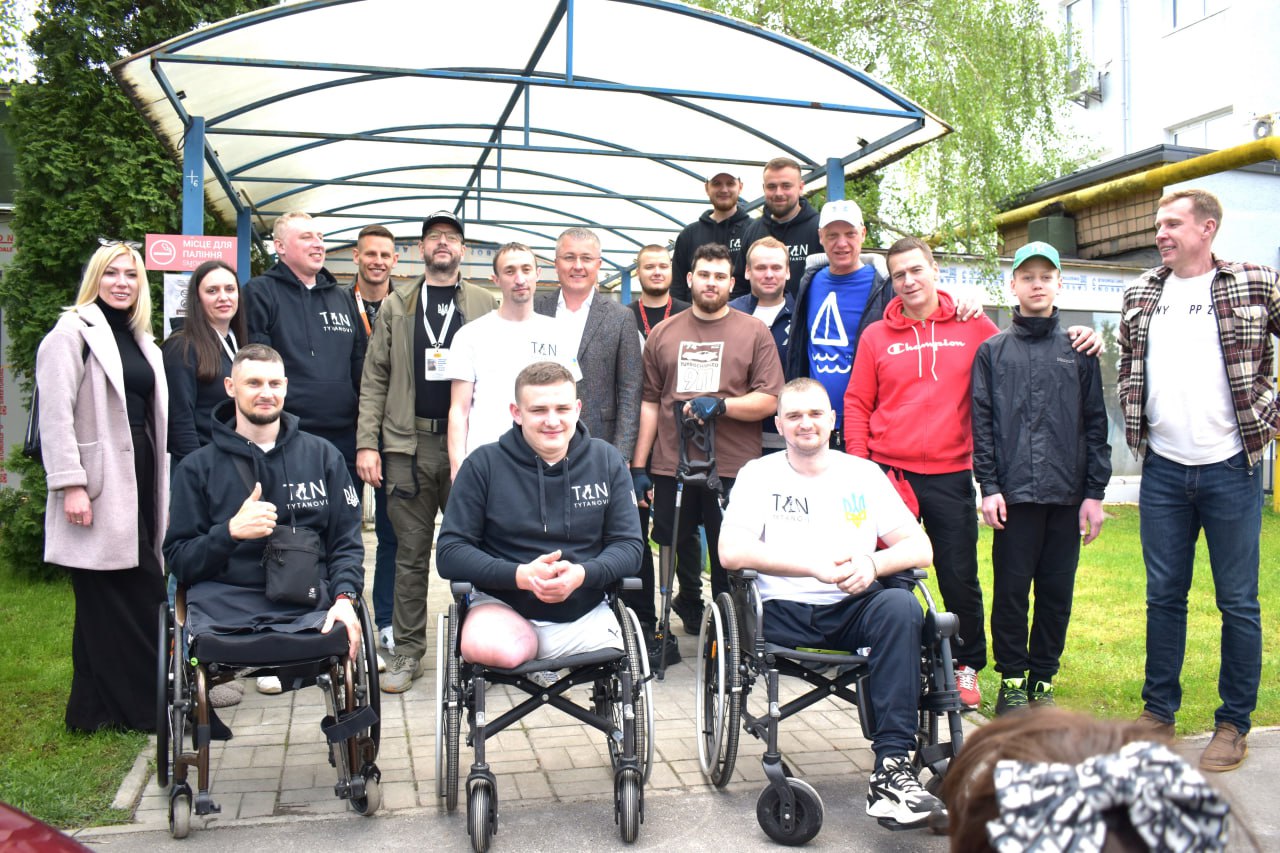
The Italian embassy in Ukraine has held a ceremony of handing over three ambulances with humanitarian aid, which was the result of the mission of the La Memoria Viva association.
According to the embassy’s press service, employees of the diplomatic institution met Italian volunteers who brought three cars for their symbolic handover to Ukrainians.
The ceremony was attended by people’s deputy Oleksiy Krasov, deputy chairman of Kharkiv region Eugene Ivanov and two representatives of local authorities from the same region – chairman of Bogodukhov district Anatoliy Rystsov and mayor of Krasnokutsk Irina Karabut.
“‘La Memoria Viva’ has launched its 45th humanitarian mission in Ukraine, which continues unabated after more than two years of invasion, and which makes us proud,” said Ambassador Pier Francesco Zazzo.
This aid, made possible thanks to the community of Osegna (Turin) and the Lions Club Turati del Canavese, dedicated to the memory of Senator Eugenio Bozzello. Two medical ambulances will be donated to Kharkiv region and a veterinary ambulance will be donated to the animal shelter “Italia KJ2”, which is run by Italian Andrea Cisternino.

The head of the Office of the President of Ukraine, Andriy Yermak, has met with a delegation of the international group of companies CRH, which is the largest producer of construction materials in North America and Europe, the press service of the Office of the President said on Tuesday evening.
It is noted that the delegation was headed by the group’s chief operating officer Randy Lake, and also included Peter Buckley, president of CRH in Europe, and Guillaume Cavalier, director of CRH in Southern and Eastern Europe.
During the meeting Yermak emphasized that Ukraine is ready to facilitate investments from such powerful global players in every possible way and to discuss all necessary issues with foreign and domestic businesses. According to him, today it is important to understand what exactly needs to be changed to improve the business climate. Strong institutions are needed, and Ukraine even during the war continues reforms, heading towards full membership in the EU.
“For our part – the President, the Office, and the Government of Ukraine – we are ready to fully support you. We are interested that such large investors work in our country and have comfortable conditions. It is very important that despite all the circumstances, the war, you are here and ready to continue to work,” – said Yermak.
As reported, the Antimonopoly Committee of Ukraine AMCU on January 23 reported on the beginning of consideration of the case on concerted actions in the form of implementation of provisions on refraining from competition, enshrined in the concentration agreement between the Irish group CRH and Dyckerhoff GmbH, owning assets in Ukraine.
In June 2023, Italian cement producer Buzzi, listed by the National Agency for the Prevention of Corruption (NAPC) as an international sponsor of war, through its subsidiary Dyckerhoff GmbH, reached an agreement to sell part of its business in Eastern Europe to Irish group CRH, including Ukrainian assets in the form of two cement plants. The transaction is expected to close in 2024.
Later, in September 2023, the AMCU returned CRH’s application for concentration without consideration due to non-compliance with the requirements, and also noted that the group occupies about one-third of the Ukrainian cement market. In October of the same year, the agency reopened the case.
CRH has been operating in Ukraine since 1999. Since November 2021, its cement enterprises in Ukraine have been operating under the Cemark brand: Podolsk Cement JSC (Khmelnytskyi oblast), Cement LLC (Odessa) and Mykolaivcement PJSC (Lviv oblast).
A separate line of CRH business in Ukraine is production of concrete and reinforced concrete products. PoliBeton Energo’s Bila Tserkva Reinforced Concrete Plant is a specialized enterprise that produces supports for power transmission lines. PoliBeton’s concrete unit in the north of Odessa joined CRH in 2020.
CRH is the world’s leading manufacturer of construction materials. The company employs about 71,000 people at its 3,200 plants in 28 countries. It is the largest producer of building materials in North America and Europe. The company is also present in Asia. CRH’s American depositary shares are listed on the New York Stock Exchange.

The prime ministers of Croatia and Greece may run for the presidency of the European Commission, German newspaper Bild reports, citing EU sources. “As an EU insider told BILD, two possible alternatives have already been proposed. Greek Prime Minister Kyriakos Mitsotakis (56, a powerful and influential member of the European People’s Party) and Croatian Prime Minister Andrej Plenkovic (54, won the internal elections this week) have expressed interest,” the Bild article says.
In March of this year, the European People’s Party voted to support European Commission President Ursula von der Leyen as a candidate for the post of European Commission President.
The President of the European Commission is appointed by the European Parliament, the elections to which will be held on June 6-9 this year.

In response to the growing need for comprehensive support for wounded who have been seriously injured in the war zone, a modern rehabilitation hub is being built in Kyiv. This project was implemented thanks to the cooperation of the Center for Saving Lives, the Association of Osteo-Integrative Prosthetics and the Esculab Laboratories network.
“Our center was created to provide our military with the best possible assistance in recovering from severe injuries. We provide not only physical rehabilitation with the help of modern equipment, but also psychological support,” said Vyacheslav Zaporozhets, director of the Center for Saving Lives charitable foundation.
According to him, the project is unique in that it uses not only the most advanced technologies for physical rehabilitation, but also creates conditions for social adaptation and moral recovery of the military.
“We want every wounded soldier who has undergone amputation to be able to return to a full life,” emphasized Mr. Zaporozhets.

In his turn, co-founder of the Esculab laboratory, Serhiy Dyadyushko, also noted the importance of the work for the veterans’ recovery.
“The network of laboratories “Esculab” is not only about business. We are honored to be a part of this project. Our participation is not limited to financing; we are also actively involved in the process of education and training of specialists, which allows us to maintain a high level of services provided at the center,” he emphasized.
The center will be equipped to the highest standards, including anti-gravity walkways and group exercise spaces that allow patients to feel comfortable and safe during their rehabilitation.
The rehabilitation center is being built on a 500-square-meter area and includes a modern walking laboratory, a wrestling room, a cardio zone, a strength training zone, a dental office, two physiotherapy rooms, a meditation and sleep room, an occupational therapy kitchen, a mini shooting range, locker rooms and showers, etc. The center can accommodate 30 patients at a time.

The project is part of a larger initiative aimed at creating a network of similar centers across the country to ensure access to high-quality rehabilitation services for all victims.
“Eskulab is a network of medical laboratories of international quality of diagnostic tests based in Lviv and has one of the largest networks of branches in Ukraine. The network includes more than 100 sampling points in the cities and towns of Lviv, Ivano-Frankivsk, Chernivtsi, Zakarpattia, Khmelnytsky, Ternopil, Rivne, Volyn regions and Kyiv. “Eskulab provides patients with the opportunity to take tests at their place of residence and receive highly accurate results. In February 2020, Esculab Medical Laboratory underwent a voluntary assessment of its measurement capabilities in accordance with the requirements of DSTU ISO 10012:2005 “Measurement management systems. Requirements for measurement processes and measuring equipment” to confirm technical competence and received a Certificate of Conformity of the measurement management system. Today, Esculab performs more than 820 types of laboratory tests.
You can learn more about the initiative to build a rehabilitation hub in the video on the Experts Club YouTube channel here:
Esculab, EXPERTS CLUB, MEDICAL_AID, MEDICINE, REHABILITATION, SERGIY_DYADYUSHKO, TYTANOVI, VYACHESLAV_ZAPOROZHETS

First Deputy Prime Minister and Minister of Economy of Ukraine Yulia Sviridenko said that more than 3.2 billion hryvnias are envisaged for Dnipropetrovsk region for this year under all support programs, the Ukrainian presidential website reported on Saturday.
At the presentation of the “Made in Ukraine” economic platform in the city of Dnipro with the participation of Ukrainian President Volodymyr Zelensky, she noted that the more actively the region’s businesses apply for the relevant programs, the more they will be able to receive. According to Sviridenko, they are distributed to the already familiar to business state support “5-7-9”, grants for processing, compensation and new programs.
Zelensky thanked entrepreneurs for staying in their region despite full-scale Russian aggression, supporting the economy and providing people with jobs. He stressed the importance of strengthening air defense and protecting the energy infrastructure in the region.
According to the president, the authorities realize that business is in a difficult situation during the war, so it was for its support, solving issues and development of domestic production that the “Made in Ukraine” platform was launched.

Canada will provide Ukraine with an additional support package in 2024, which includes budget support of 2.4 billion Canadian dollars, Ukrainian Ambassador to Canada Yulia Kovaliv said on her Facebook page.
“We have an additional package of support from Canada in the submitted budget for 2024.
Budget support in the amount of 2.4 billion Canadian dollars (of which 2 billion have already been transferred through the IMF Special Account), an additional 400 million will arrive in the coming months.
1.6 billion Canadian dollars as part of a new 5-year military assistance program under the Security Agreement signed in Kiev on 24.02.2024.
216.7 million Canadian dollars through the EBRD to fund Ukraine’s reconstruction projects.
76 million Canadian dollars to finance projects under the program to maintain peace and security in Ukraine, in particular humanitarian demining,” – wrote Kovaliv.
Also, the Ambassador emphasized, the budget notes the plan of the Government of Canada to cooperate with international partners, the G7 countries to bring Russia to account, including through the confiscation of sovereign assets of the Russian Federation.